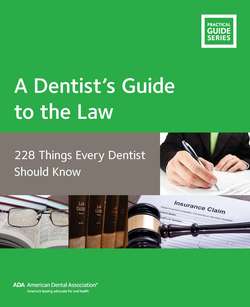Читать книгу A Dentist’s Guide to the Law - American Dental Association - Страница 74
На сайте Литреса книга снята с продажи.
39. Can I Send Information About Products Or Services To Patients, Or Provide Patient Lists To a Company That Wants To Send Them Information?
ОглавлениеHIPAA imposes restrictions on covered dental practices that wish to send marketing communications to their patients (or allow others to send marketing communications to their patients). In many cases, the dental practice must have a valid, written patient authorization to use or disclose patient information for marketing communications, and the authorization must contain specific information. Under new rules that took effect on September 23, 2013, if a dental practice (or its business associate) receives “financial remuneration” (dollars) for making a marketing communication from a third party whose product or service is being marketed, or by someone else on the third party’s behalf, the dental practice is required to have a patient sign an authorization form if the dental practice will use patient information in order to make the marketing communication (e.g., patient names and addresses, or information about a patient’s dental condition). The authorization form must state that the dental practice received payment for making the communication. The new rule does not apply if the dentist receives nonfinancial or in-kind remuneration for making the communication if the communication is for a permissible purpose under HIPAA. There are several exceptions to the authorization requirement. For example, patient authorization is not required for face-to-face communications or for promotional gifts of nominal value.
The September 23, 2013 HIPAA rules also contain restrictions on providing patient lists to others. Under the new rules, even if a disclosure is permitted by HIPAA, a dental practice cannot exchange patient information for remuneration from or on behalf of the recipient of the information without a signed authorization from the patient that states that the dental practice will be remunerated for the disclosure. The new rule applies whether the remuneration is direct or indirect, and it applies whether or not the remuneration is financial (that is, the new rule also applies if the remuneration is nonfinancial or in-kind). There are limited exceptions to the new rule, such as the sale of a dental practice to another HIPAA covered entity (or to a buyer that will become a covered entity after the sale), and for related due diligence.
